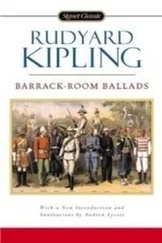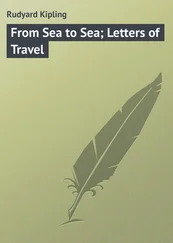Джозеф Киплинг - From Sea to Sea
Здесь есть возможность читать онлайн «Джозеф Киплинг - From Sea to Sea» весь текст электронной книги совершенно бесплатно (целиком полную версию без сокращений). В некоторых случаях можно слушать аудио, скачать через торрент в формате fb2 и присутствует краткое содержание. Год выпуска: 2014, Издательство: epubBooks Classics, Жанр: Биографии и Мемуары, Публицистика, на английском языке. Описание произведения, (предисловие) а так же отзывы посетителей доступны на портале библиотеки ЛибКат.
- Название:From Sea to Sea
- Автор:
- Издательство:epubBooks Classics
- Жанр:
- Год:2014
- ISBN:нет данных
- Рейтинг книги:3 / 5. Голосов: 1
-
Избранное:Добавить в избранное
- Отзывы:
-
Ваша оценка:
- 60
- 1
- 2
- 3
- 4
- 5
From Sea to Sea: краткое содержание, описание и аннотация
Предлагаем к чтению аннотацию, описание, краткое содержание или предисловие (зависит от того, что написал сам автор книги «From Sea to Sea»). Если вы не нашли необходимую информацию о книге — напишите в комментариях, мы постараемся отыскать её.
From Sea to Sea — читать онлайн бесплатно полную книгу (весь текст) целиком
Ниже представлен текст книги, разбитый по страницам. Система сохранения места последней прочитанной страницы, позволяет с удобством читать онлайн бесплатно книгу «From Sea to Sea», без необходимости каждый раз заново искать на чём Вы остановились. Поставьте закладку, и сможете в любой момент перейти на страницу, на которой закончили чтение.
Интервал:
Закладка:
Thanks to the courtesy of the Maharaja, it is possible to see everything, but for the incurious who object to being driven through their sights, a journey down any one of the great main streets is a day's delightful occupation. The view is as unobstructed as that of the Champs Élysées; but in place of the white–stone fronts of Paris, rises a long line of open–work screen–wall, the prevailing tone of which is pink, caramel–pink, but house–owners have unlimited license to decorate their tenements as they please. Jeypore, broadly considered, is Hindu, and her architecture of the riotous, many–arched type which even the Globe–trotter after a short time learns to call Hindu. It is neither temperate nor noble, but it satisfies the general desire for something that "really looks Indian."
A perverse taste for low company drew the Englishman from the pavement—to walk upon a real stone pavement is in itself a privilege—up a side–street, where he assisted at a quail fight and found the low–caste Rajput a cheery and affable soul. The owner of the losing quail was a trooper in the Maharaja's army. He explained that his pay was six rupees a month paid bimonthly. He had to pay the cost of his khaki blouse, brown–leather accoutrements, and jack–boots; lance, saddle, sword, and horse were given free. He refused to tell for how many months in the year he was drilled, and said vaguely that his duties were mainly escort ones, and he had no fault to find with them. The defeat of his quail had vexed him, and he desired the Sahib to understand that the sowars of His Highness's army could ride. A clumsy attempt at a compliment so fired his martial blood that he climbed into his saddle, and then and there insisted on showing off his horsemanship. The road was narrow, the lance was long, and the horse was a big one, but no one objected, and the Englishman sat him down on a doorstep and watched the fun. The horse seemed in some shadowy way familiar. His head was not the lean head of the Kathiawar, nor his crest the crest of the Marwarri, and his forelegs did not belong to these stony districts. "Where did he come from?" The sowar pointed northward and said, "from Amritsar," but he pronounced it "Armtzar." Many horses had been bought at the spring fairs in the Punjab; they cost about two hundred rupees each—perhaps more, the sowar could not say. Some came from Hissar and some from other places beyond Delhi. They were very good horses. "That horse there," he pointed to one a little distance down the street, "is the son of a big Government horse—the kind that the Sirkar make for breeding horses—so high!" The owner of "that horse" swaggered up, jaw bandaged and cat–moustached, and bade the Englishman look at his mount; bought, of course, when a colt. Both men together said that the Sahib had better examine the Maharaja Sahib's stable, where there were hundreds of horses, huge as elephants or tiny as sheep.
To the stables the Englishman accordingly went, knowing beforehand what he would find, and wondering whether the Sirkar's "big horses" were meant to get mounts for Rajput sowars. The Maharaja's stables are royal in size and appointments. The enclosure round which they stand must be about half a mile long—it allows ample space for exercising, besides paddocks for the colts. The horses, about two hundred and fifty, are bedded in pure white sand—bad for the coat if they roll, but good for the feet—the pickets are of white marble, the heel–ropes in every case of good sound rope, and in every case the stables are exquisitely clean. Each stall contains above the manger, a curious little bunk for the syce who, if he uses the accommodation, must assuredly die once each hot weather.
A journey round the stables is saddening, for the attendants are very anxious to strip their charges, and the stripping shows so much. A few men in India are credited with the faculty of never forgetting a horse they have once seen, and of knowing the produce of every stallion they have met. The Englishman would have given something for their company at that hour. His knowledge of horse–flesh was very limited; but he felt certain that more than one or two of the sleek, perfectly groomed country–breds should have been justifying their existence in the ranks of the British cavalry, instead of eating their heads off on six seers [1] A seer is about two pounds.
of gram and one of sugar per diem. But they had all been honestly bought and honestly paid for; and there was nothing in the wide world to prevent His Highness, if he wished to do so, from sweeping up the pick and pride of all the stud–bred horses in the Punjab. The attendants appeared to take a wicked delight in saying "eshtud–bred" [2] Stud–bred, i.e. bred at the Indian Government studs.
very loudly and with unnecessary emphasis as they threw back the loin–cloth. Sometimes they were wrong, but in too many cases they were right.
The Englishman left the stables and the great central maidan, where a nervous Biluchi was being taught, by a perfect network of ropes, to "monkey–jump," and went out into the streets reflecting on the working of horse–breeding operations under the Government of India, and the advantages of having unlimited money wherewith to profit by other people's mistakes.
Then, as happened to the great Tartarin of Tarescon, wild beasts began to roar, and a crowd of little boys laughed. The lions of Jeypore are tigers, caged in a public place for the sport of the people, who hiss at them and disturb their royal feelings. Two or three of the six great brutes are magnificent. All of them are short–tempered, and the bars of their captivity not too strong. A pariah–dog was furtively trying to scratch out a fragment of meat from between the bars of one of the cages, and the occupant tolerated him. Growing bolder, the starveling growled; the tiger struck at him with his paw, and the dog fled howling with fear. When he returned, he brought two friends with him, and the three mocked the captive from a distance.
It was not a pleasant sight and suggested Globe–trotters—gentlemen who imagine that "more curricles" should come at their bidding, and on being undeceived become abusive.
III
Does Not in Any Sort Describe the Dead City of Amber, but Gives Detailed Information About a Cotton-press
And what shall be said of Amber, Queen of the Pass—the city that Jey Singh bade his people slough as snakes cast their skins? The Globe–trotter will assure you that it must be "done" before anything else, and the Globe–trotter is, for once, perfectly correct. Amber lies between six and seven miles from Jeypore among the "tumbled fragments of the hills," and is reachable by so prosaic a conveyance as a ticca–ghari , and so uncomfortable a one as an elephant. He is provided by the Maharaja, and the people who make India their prey, are apt to accept his services as a matter of course.
Rise very early in the morning, before the stars have gone out, and drive through the sleeping city till the pavement gives place to cactus and sand, and educational and enlightened institutions to mile upon mile of semi–decayed Hindu temples—brown and weather–beaten—running down to the shores of the great Man Sagar Lake, wherein are more ruined temples, palaces, and fragments of causeways. The water–birds have their home in the half–submerged arcades and the crocodile nuzzles the shafts of the pillars. It is a fitting prelude to the desolation of Amber. Beyond the Man Sagar the road of to–day climbs up–hill, and by its side runs the huge stone causeway of yesterday—blocks sunk in concrete. Down this path the swords of Amber went out to kill. A triple wall rings the city, and, at the third gate, the road drops into the valley of Amber. In the half light of dawn, a great city sunk between hills and built round three sides of a lake is dimly visible, and one waits to catch the hum that should arise from it as the day breaks. The air in the valley is bitterly chill. With the growing light, Amber stands revealed, and the traveller sees that it is a city that will never wake. A few beggars live in huts at the end of the valley, but the temples, the shrines, the palaces, and the tiers–on–tiers of houses are desolate. Trees grow upon and split the walls, the windows are filled with brushwood, and the cactus chokes the street. The Englishman made his way up the side of the hill to the great palace that overlooks everything except the red fort of Jeighur, guardian of Amber. As the elephant swung up the steep roads paved with stone and built out on the sides of the hill, he looked into empty houses where the little grey squirrel sat and scratched its ears. The peacock walked on the house–tops, and the blue pigeon roosted within. He passed under iron–studded gates whose hinges were eaten out with rust, and by walls plumed and crowned with grass, and under more gate–ways, till, at last, he reached the palace and came suddenly into a great quadrangle where two blinded, arrogant stallions, covered with red and gold trappings, screamed and neighed at each other from opposite ends of the vast space. For a little time these were the only visible living beings, and they were in perfect accord with the spirit of the spot. Afterwards certain workmen appeared; for it seems that the Maharaja keeps the old palace of his forefathers in good repair, but they were modern and mercenary, and with great difficulty were detached from the skirts of the traveller. A somewhat extensive experience of palace–seeing had taught him that it is best to see palaces alone, for the Oriental as a guide is undiscriminating and sets too great a store on corrugated iron roofs and glazed drain–pipes.
Читать дальшеИнтервал:
Закладка:
Похожие книги на «From Sea to Sea»
Представляем Вашему вниманию похожие книги на «From Sea to Sea» списком для выбора. Мы отобрали схожую по названию и смыслу литературу в надежде предоставить читателям больше вариантов отыскать новые, интересные, ещё непрочитанные произведения.
Обсуждение, отзывы о книге «From Sea to Sea» и просто собственные мнения читателей. Оставьте ваши комментарии, напишите, что Вы думаете о произведении, его смысле или главных героях. Укажите что конкретно понравилось, а что нет, и почему Вы так считаете.












